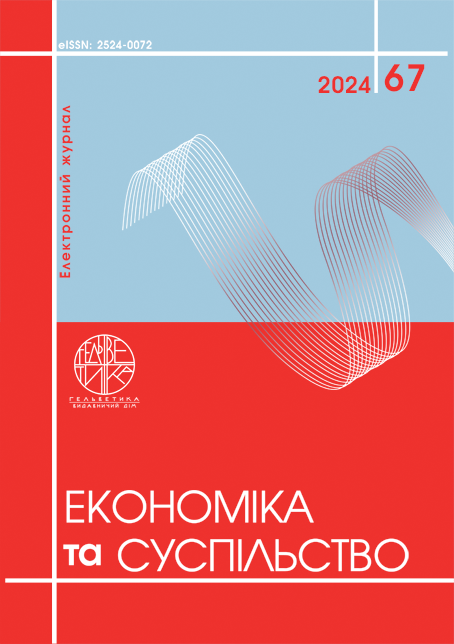TAX INCENTIVES FOR AGRICULTURAL PRODUCT EXPORTERS: INTERNATIONAL EXPERIENCE AND OPPORTUNITIES FOR UKRAINE
Abstract
The article examines an importance of tax incentives in fostering the export of agricultural products. It emphasizes that in EU countries, developed mechanisms such as VAT exemptions and simplified customs procedures significantly reduce the financial burden on exporters and enhance their competitiveness. Countries like Germany, France, China, and the United States are highlighted for their effective use of these tax incentives, which have led to increased export volumes and greater international market participation. The article analyzes how free economic zones and the Authorized Economic Operator status provide additional benefits for exporting companies, streamlining customs processes and reducing the time and costs involved in international trade operations. The study suggests that the adaptation of these approaches in Ukraine could play a pivotal role in facilitating its integration into global markets and attracting foreign investment.The article delves into the role of tax reliefs, especially VAT exemptions, as one of the main drivers of export growth. A detailed analysis of Poland, China, and Canada provides insight into how such policies help companies reduce production costs and improve competitiveness. The authors emphasize the need for Ukraine to implement these measures, particularly in the context of its European integration process, which requires harmonizing trade and customs legislation with EU standards. By simplifying VAT refund procedures and adopting FEZ and AEO models, Ukraine could increase its export volumes and strengthen its position in the international market. The authors suggest that Ukraine should consider introducing tax exemptions for exporters on a more extensive scale, particularly in industries with high export potential such as technology and agriculture. Additionally, the development of industrial parks and investment-friendly policies could attract foreign capital and further stimulate export activities. The study underscores the importance of clear adherence to customs and tax regulations to ensure the stability and efficiency of these tax incentive mechanisms.
References
Міністерство фінансів України. Авторизовані економічні оператори. URL: https://mof.gov.ua/uk/authorized_economic_operators-470
Kong D., Xiong M. Unintended consequences of tax incentives on export product quality: Evidence from a natural experiment in China. International Journal of Industrial Organization. 2021. № 29(4). С. 802–837.
Dai X., Chapman G. R&D tax incentives and innovation: Examining the role of programme design in China. Technovation. 2022. № 113. 102419. DOI: https://doi.org/10.1016/j.technovation.2021.102419
Zhang D. Is export tax rebate a quality signal to determine firms’ capital structure? A financial intermediation perspective. Research in International Business and Finance. 2021. № 55. 101317. DOI: https://doi.org/10.1016/j.ribaf.2020.101317
Hallen B.L., Cohen S.L., Bingham C.B. Do accelerators work? If so, how? Organization Science. 2020. № 31. С. 378–414. DOI: https://doi.org/10.1287/orsc.2019.1304
Manaresi F., Palma A., Salvatici L., Scrutinio V. Managerial input and firm performance: Evidence from a policy experiment (No. dp1871). Centre for Economic Performance, LSE, London, UK. 2022.
Кишакевич Б.Ю., Демедюк Б.Т. Податкове стимулювання розвитку малого та середнього бізнесу у країнах ЄС. Ефективна економіка. 2023. № 9.
Кишакевич Б.Ю., Юзьв’як О.А. Моделювання економічного капіталу банку для кредитного та ринкового ризиків. Вісник ХНУ України: Науковий журнал. Економічні науки. 2015. Вип. 3, Т.1. С. 124–127.
Okoth E. Effects of Tax Incentives and Subsidies on Economic Growth in Developing Economies. International Journal of Research and Innovation in Social Science (IJRISS). 2023. 7(7). URL: https://ssrn.com/abstract=4532631
Ministry of Finance of Ukraine. Authorized economic operators. Available at: https://mof.gov.ua/uk/authorized_economic_operators-470
Kong, D., Xiong, M. (2021). Unintended consequences of tax incentives on export product quality: Evidence from a natural experiment in China. International Journal of Industrial Organization, vol. 29(4), 802–837.
Dai, X., Chapman, G. (2022). R&D tax incentives and innovation: Examining the role of programme design in China. Technovation, vol. 113, 102419. DOI: https://doi.org/10.1016/j.technovation.2021.102419
Zhang, D. (2021). Is export tax rebate a quality signal to determine firms’ capital structure? A financial intermediation perspective. Research in International Business and Finance, vol. 55, 101317. DOI: https://doi.org/10.1016/j.ribaf.2020.101317
Hallen, B.L., Cohen, S.L., Bingham, C.B. (2020). Do accelerators work? If so, how? Organization Science, vol. 31, pp. 378–414. DOI: https://doi.org/10.1287/orsc.2019.1304
Manaresi, F., Palma, A., Salvatici, L., Scrutinio, V. (2022). Managerial input and firm performance: Evidence from a policy experiment (No. dp1871). Centre for Economic Performance, LSE, London, UK.
Kyshakevych, B.Y., Demedyuk, B.T. (2023). Podatkove stymuliuvannia rozvytku maloho ta serednoho biznesu u krainakh YeS. [Tax incentives for the development of small and medium-sized businesses in EU countries] Efektyvna ekonomika – Efficient economy, vol. 9.
Kyshakevych, B.Y., Yuzvyak, O.A. (2015). Modeliuvannia ekonomichnoho kapitalu banku dlia kredytnoho ta rynkovoho ryzykiv [Modeling the bank's economic capital for credit and market risks]. Bulletin of the KhNU of Ukraine: Scientific journal. Economic sciences – Visnyk KhNU Ukrainy: Naukovyi zhurnal. Ekonomichni nauky, vol. 3(1), pp. 124–127.
Okoth, E. (2023). Effects of tax incentives and subsidies on economic growth in developing economies. International Journal of Research and Innovation in Social Science (IJRISS), vol. 7(7). Available at: https://ssrn.com/abstract=4532631

This work is licensed under a Creative Commons Attribution 4.0 International License.


